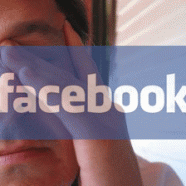 In yesterday’s The Huffington Post, notorious Facebook criticizer Mark Cuban, Owner of the Dallas Mavericks and Chairman of HDNet, wrote a provocative post – “What I Really Think of Facebook”.
In yesterday’s The Huffington Post, notorious Facebook criticizer Mark Cuban, Owner of the Dallas Mavericks and Chairman of HDNet, wrote a provocative post – “What I Really Think of Facebook”.
In this post Cuban captured a common sentiment that is circulating the web.
Facebook is ruining Facebook.
How is Facebook ruining itself? By taking itself too seriously. By over thinking it’s purpose. By capitulating to marketers and brands.
In Cuban’s mind (and many others), people use Facebook to combat boredom, to see what’s going on with their friends and family, to be distracted and even to get out of awkward situations.
On this front, I believe that he’s absolutely right. This gets to the heart of the Facebook experience that all too often, marketers lose sight of.
People are NOT on Facebook to buy stuff. They are NOT on Facebook with the express purpose of signing up for your email newsletter, donating to your cause or signing your petition. However, they may do so while they are there (in growing numbers). But this is not their intent when they sign on.
One billion people have signed up for Facebook for their own personal, self-serving reasons. Facebook is a unique online experience in that it can be completely customized; it’s you in your own little bubble, seeing what you want when you want.
In that spirit, I want to offer my own opinions on this debate:
1) Facebook is making brands and nonprofits look desperate.
We are told that photos get the most engagement (then we are told that they don’t); we are told to ask questions but then we look like we are trying too hard; we are told that sharing great content is the only way to succeed but then so much of what we think is great is posted to a symphony of crickets.
So what do we do? We post photos of cute cats just to get a few Likes.
Check out my favorite satirical Facebook brand page for a few examples of marketers getting desperate for engagement, any engagement. To me, this seems to be a cruel cycle – when you actually have something interesting to share it is less likely to be noticed because of all the noise.
2) EdgeRank is detrimental to authenticity and genuine engagement.
With EdgeRank controlling what gets seen in our News Feed, marketers are frantic for some sort of interaction on each post.
For this reason, marketers are more likely to stick to a formula and not deviate in any way. Brands are less and less likely to go off topic and to take risks if they know they will be penalized.
In this punitive environment, we want to stick with sure things and not try new things.
3) What about content that doesn’t lend itself to “Likes” or “Comments”?
I have always had a problem with the “Like” button (although I use it prolifically). It seems so superficial and passive.
What about nonprofits who have less-than-likeable causes? What about domestic violence shelters posting horrific statistics about women and children being abused? Who would want to “Like” that statistic or share it?
Yet, for many nonprofits, sharing shocking images and statistics is a huge part of their strategy to raise awareness and get people talking.
Are we all simply posting happy, positive content just to get more engagement, even if it doesn’t tell the whole story?
4) People who use Facebook as an information source are ignored in all this.
A study released in February by the Pew Internet & American Life Project found that about only about half of Facebook users comment, like or share content in their News Feed in the average month.
Many people who use Facebook are what I call “skulkers” – they skulk, but don’t contribute to the conversations.
So how are these people counted? If you never interact with content in your News Feed other than reading it, how can your individual EdgeRank score be calculated?
Cuban uses the example of the Mavericks’ Facebook Page posting scores at the end of every quarter. The fans may not click the Like button (for instance, if they are losing) and they probably won’t want to comment on the score or share it since its so fleeting.
But these fans still want to see those scores in their News Feed. How can EdgeRank take that into account?
5) The majority of people are not Facebook super-users and do not fully customize their News Feeds.
Cuban writes: “Doesn’t Facebook realize that is far easier for a user to opt-out of a feed by un-Liking a brand/person/page that has done a poor job of communication than it is to mess with all the account settings or for them to try to tweak their algorithm all the time to try to guess what people want?”
Facebook recognizes the fact that many users do not take the time to opt-out. People like tons of pages and then forget what they liked. They Like pages to enter contests and raffles and never engage with the page after that.
Users often don’t know how to Hide or go back to the page and un-Like it. It seems simple enough to prolific Facebook users, but to many average people, they don’t take that step – they just Hide or ignore the content posted by the page.
So, what are the answers?
- Facebook is not a silver bullet. Never will be, never has been. As I have said before, it is a tool in your marketing tool belt, just like a telephone, a laptop and an internet connection. It is not the marketing tool belt itself.
- Diversify across a few platforms – don’t put all your eggs in one basket.
- Even though Facebook may be trying to help by throwing marketers some bones – Page Feed and Get Notifications – these are not a panacea. (John Haydon writes about this as does Jon Loomer.)
- Most importantly: No amount of social media marketing will make up for a crappy product or service. (Ask Seth Godin how he feels about this topic.)
What are your thoughts on this debate? Please add to the conversation by posting in the Comments section or on my Facebook page. Thanks for reading!

Comments 2
Good points all. I think that the scales may be dropping in the wider public’s eyes as to what they can realistically achieve through FB as a marketing platform.
I agree completely that Facebook is shooting themselves in the proverbial foot. And I also agree that creating arcane formulas to decide what will interest the user just leads to more people trying to game the system. As a user, what I see no longer interests me because it’s a cacophony of people begging me to like their posts, to add them to interest lists or to choose get notifications, etc. I see more of those requests than I do actual interesting content anymore.